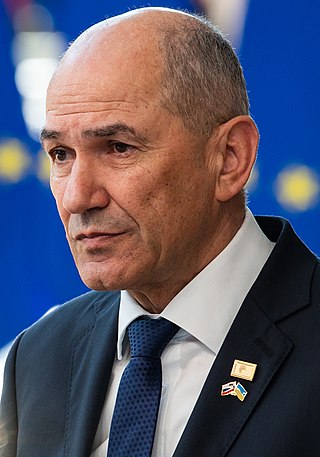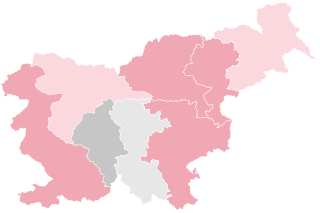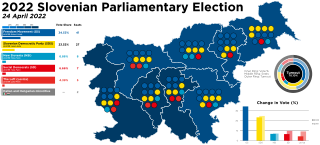Contents
| |||||
| Decades: | |||||
|---|---|---|---|---|---|
| See also: | |||||
Events in the year 2012 in Slovenia .
| |||||
| Decades: | |||||
|---|---|---|---|---|---|
| See also: | |||||
Events in the year 2012 in Slovenia .



The Slovenian Democratic Party, formerly the Social Democratic Party of Slovenia, is a conservative parliamentary party; it is also one of the largest parties in Slovenia, with approximately 30,000 reported members in 2013.

The Social Democrats is a centre-left and pro-European social-democratic political party in Slovenia led by Matjaž Han. From 1993 until 2005, the party was known as the United List of Social Democrats. It is the successor of the League of Communists of Slovenia. As of 2022, the party is a member of a three-party coalition government with Robert Golob's Freedom Movement alongside The Left, as well as a full member of the Party of European Socialists and Progressive Alliance.

Ivan Janša, baptized and best known as Janez Janša, is a Slovenian politician who served three times as a prime minister of Slovenia, a position he had held from 2004 to 2008, from 2012 to 2013, and from 2020 to 2022. Since 1993, Janša has led the Slovenian Democratic Party, which has emerged as the pre-eminent Slovenian conservative party. Janša lost his fourth bid for prime minister in April 2022, his party defeated by the Freedom Movement party.

Borut Pahor is a Slovenian politician who served as President of Slovenia from 2012 to 2022. He previously served as Prime Minister of Slovenia from 2008 to 2012.

Gregor Virant is a Slovenian politician and public servant. Between 2004 and 2008, he served as Minister of Public Administration in Janez Janša's first government, between 2011–2013 he was Speaker of the National Assembly of Slovenia. He also served as Minister of the Interior and Public Administration in the government of Alenka Bratušek between 2013 and 2014.

Parliamentary elections were held in Slovenia on 4 December 2011 to elect the 90 deputies of the National Assembly. This was the first early election in Slovenia's history. The election was surprisingly won by the center-left Positive Slovenia party, led by Zoran Janković. However, he failed to be elected as the new prime minister in the National Assembly, and the new government was instead formed by a right-leaning coalition of five parties, led by Janez Janša, the president of the second-placed Slovenian Democratic Party. The voter turnout was 65.60%.
The 2011 Slovenian YouTube incident was the publication of three clips of the recordings of closed sessions of the Government of Slovenia on the video-sharing website YouTube on 3 December 2011. The clips were published under the title Stari obrazi by someone who signed himself as stariobrazi (oldfaces). The publication happened during the term of the Prime Minister Borut Pahor, just before the early 2011 Slovenian parliamentary election on 4 December.

Presidential elections were held in Slovenia on 11 November 2012, with a run-off held on 2 December. Slovenia's 1.7 million registered voters chose between the incumbent president Danilo Türk, the SDS/NSi party candidate Milan Zver and Borut Pahor of the Social Democrats who was also supported by the Civic List. The first round was won, contrary to the opinion poll predictions, by Pahor, with Türk placing second. In the run-off election, Pahor won with roughly two-thirds of the vote.

Polde Bibič was a Slovenian stage and film actor, a writer, and an academic professor, best known for his role in the film Flowers in Autumn and his work in theater, Bibič was a recipient of several top awards in the field of arts in Slovenia.

Parliamentary elections were held in Slovenia on 13 July 2014 to elect the 90 deputies of the National Assembly. The early election, less than three years after the previous one, was called following the resignation of Alenka Bratušek's government in May. Seventeen parties participated, including seven new parties, some of which formed only months before the election took place. Party of Miro Cerar (SMC), a new party led by lawyer and professor Miro Cerar, won the election with over 34% of the vote and 36 seats. Seven political parties won seats in the National Assembly. Three political parties left the Assembly, including Zoran Janković's Positive Slovenia, the winner of the 2011 election, and the Slovenian People's Party, which failed to win a seat for the first time since the first elections in 1990. A leftist United Left party entered the Assembly for the first time, winning six seats.

Parliamentary elections were held in Slovenia on 3 June 2018. The elections were originally expected to be held later in June 2018, but after the resignation of Prime Minister Miro Cerar on 14 March 2018 all parties called for snap elections. They were the third consecutive snap elections after 2011 and 2014.

Presidential elections were held in Slovenia on 22 October 2017. Nine candidates ran in the first round of the elections, in which the incumbent independent President Borut Pahor placed first and Marjan Šarec of the List of Marjan Šarec (LMŠ) placed second. No candidate received a majority of the vote in the first round, resulting in a run-off between Pahor and that was held on 12 November 2017. Pahor won the run-off with 53% of the vote; voter turnout in the second round was 42.13%, the lowest in any presidential election since independence.

Marjan Šarec is a Slovenian politician, actor and comedian who served as Prime Minister of Slovenia from 2018 to 2020. He also served as the Minister of Defence in the government of Prime Minister Robert Golob from June 2022 to July 2024 when he was elected to the European Parliament.
Events in the year 2018 in Slovenia.

Parliamentary elections were held in Slovenia on 24 April 2022 to elect all 90 members of the National Assembly.
Events in the year 2020 in Slovenia.
Events in the year 2021 in Slovenia. The year was marked by the continuation of the COVID-19 pandemic in Slovenia.
Events in the year 2022 in Slovenia.
Events in the year 2008 in Slovenia.
Events in the year 2013 in Slovenia.